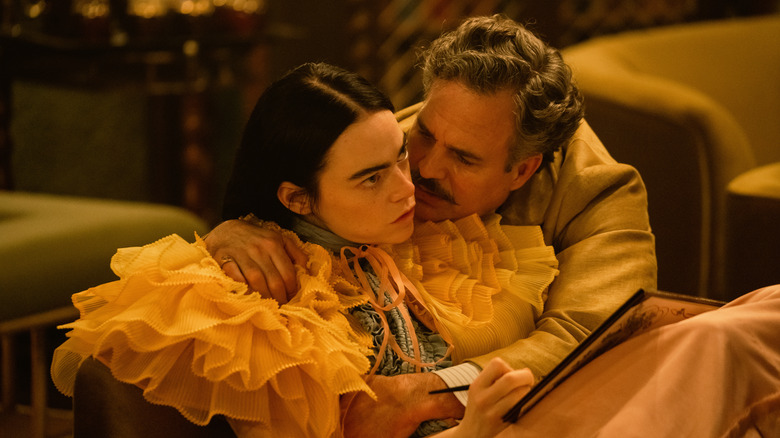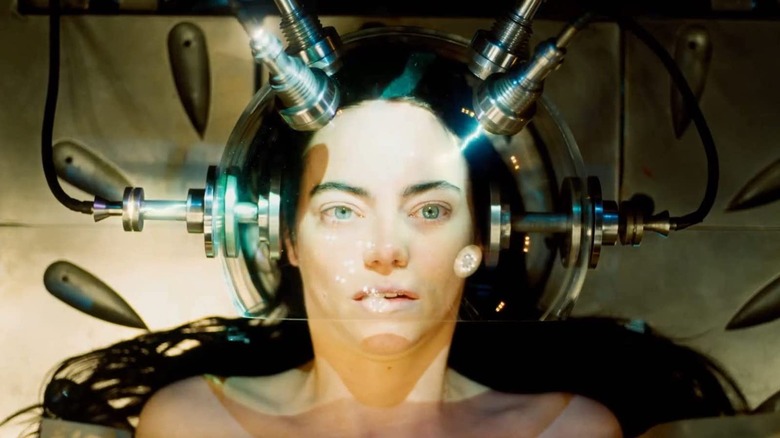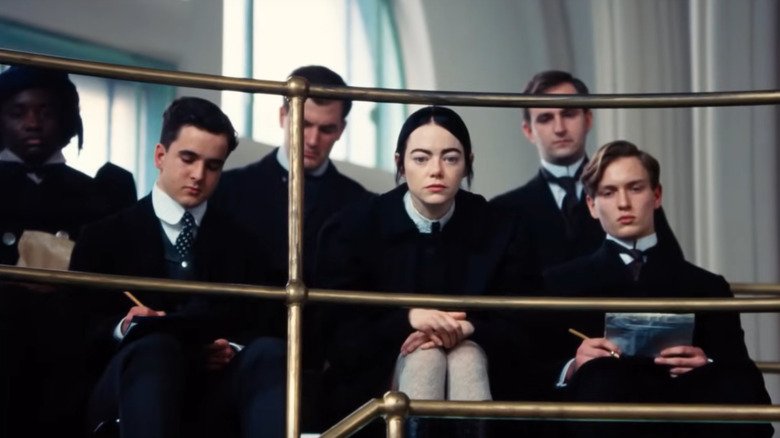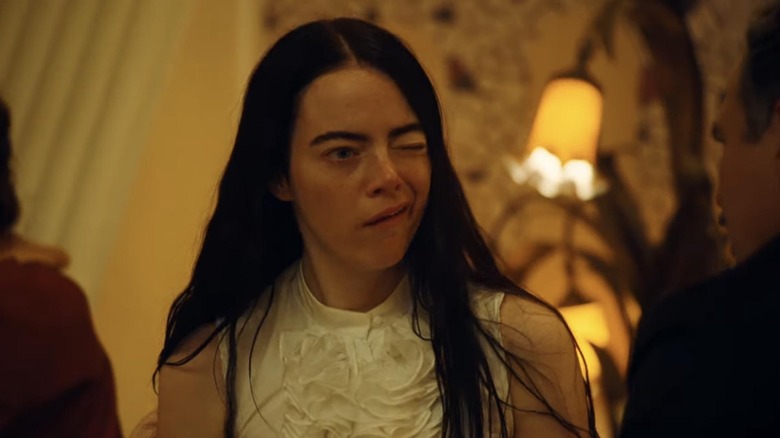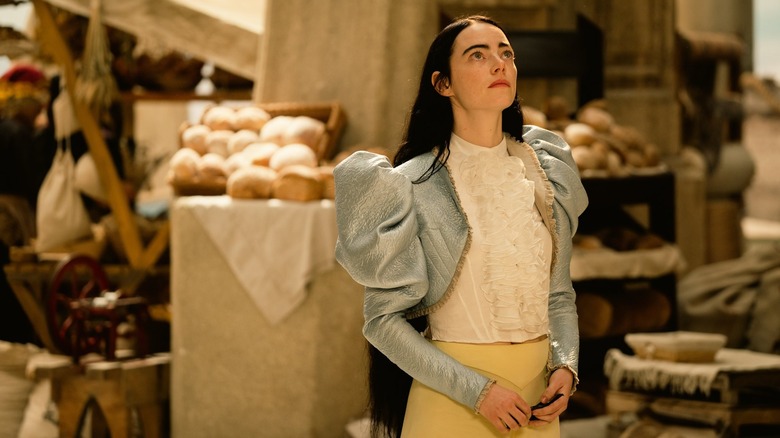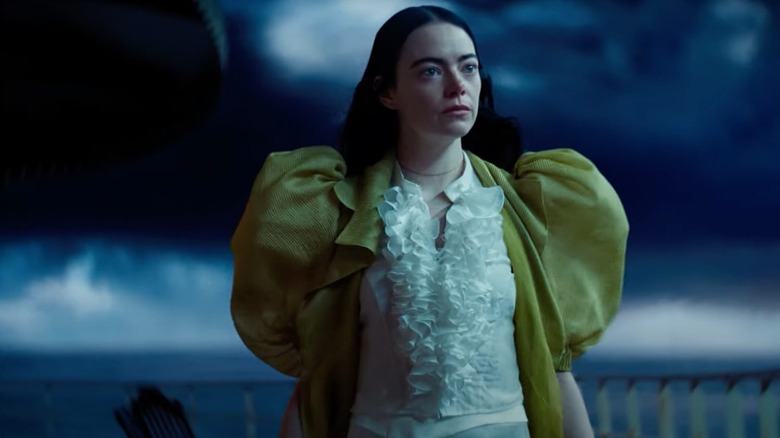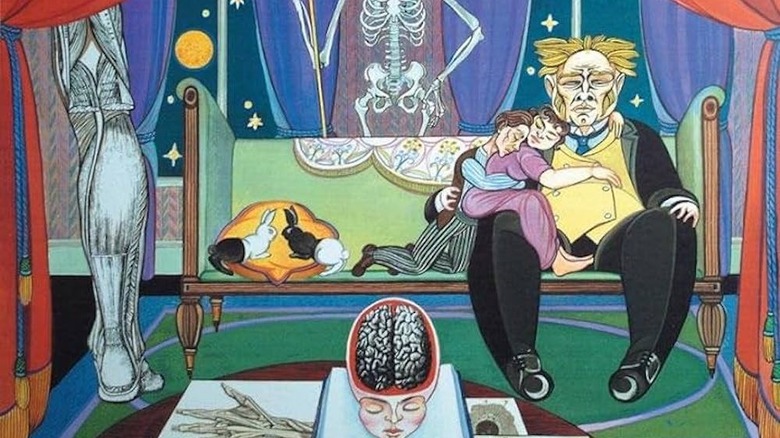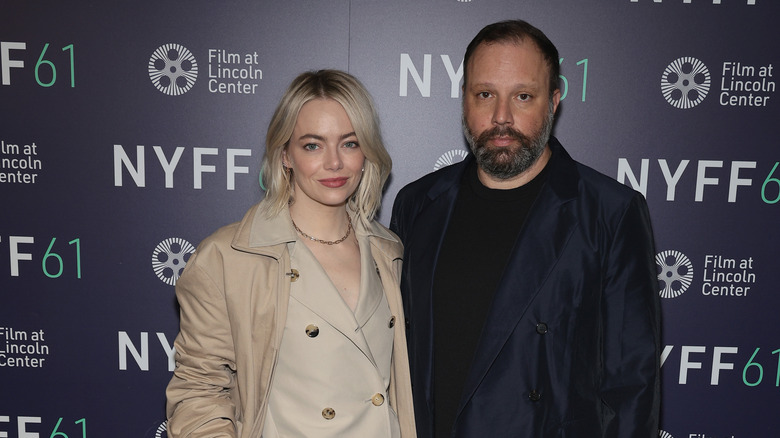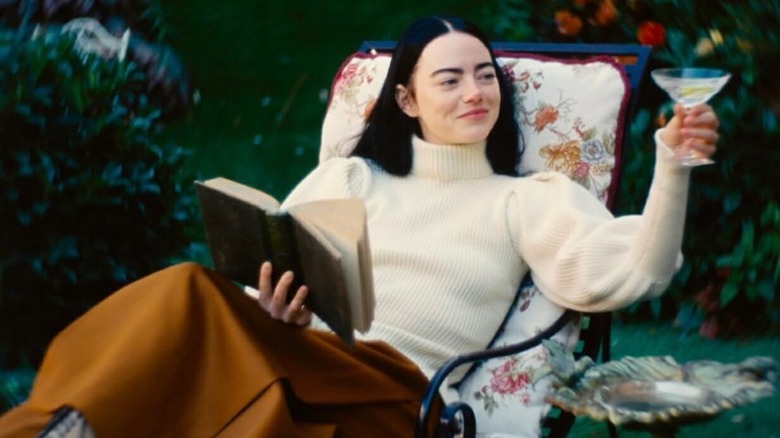The Ending Of Poor Things Explained
This article contains spoilers for "Poor Things" and some discussion of disturbing content.
One of the best films of 2023, "Poor Things" is an adaptation of Alasdair Gray's novel of the same name from director Yorgos Lanthimos and writer Tony McNamara. This darkly comedic, sexually explicit, surrealist steampunk fantasy delivers both a thoughtful feminist spin on the story of "Frankenstein" and loads of entertainment along the way. In many ways, it's a work of excess, filled with sex, violence, and dark humor. That excess will almost certainly be too much for some to get into. However, its weird parts are stitched together so skillfully that it might very well appeal to a wider audience than it sounds like it would on paper.
"Poor Things" may be extremely strange and, at times, disturbing, but surprisingly, it's not confusing to follow. The events of the story are told in the straightforward fashion of a classic Hollywood hero's journey — in contrast to its more structurally complicated literary source material — and the heavy thematic ideas it explores are presented clearly and emphatically. As such, the ending of the film might not require "explanation" to understand, necessarily, but there's still a lot to discuss and dig deeper into regarding those themes. So let's examine what Lanthimos' film is saying about the development of identity, feminine sexuality, and challenging oppressive norms.
What you need to remember about the plot of Poor Things
"Poor Things" follows the journey of Bella Baxter (Emma Stone), the Frankenstein-esque creation of Dr. Godwin Baxter (Willem Dafoe). Bella's body comes from a woman who died by suicide, while her brain comes from that woman's still-living baby. Observed by Godwin's assistant Max McCandles (Ramy Youssef), Bella's physical, verbal, and intellectual abilities mature at a rapid pace. Eventually, Max asks for her hand in marriage, which she accepts. But Bella wants to see the world, which her creator won't allow, so she runs away — and has a lot of passionate sex — with a trouble-making lawyer named Duncan Wedderburn (Mark Ruffalo) on a trip across Europe.
In Lisbon, Bella indulges her taste for sex and sweets while awkwardly failing to learn the rules of "polite society." On a boat voyage, she learns of human suffering from the cynical Harry Astley (Jerrod Carmichael). Heartbroken at seeing the poverty in Alexandria, she takes all of Duncan's money and gives it away — which Duncan isn't happy about. Seemingly destitute in Paris, Bella views poverty as an "experiment," finding work in a brothel. Choosing to stay there, she sends Duncan off with some emergency money she conveniently forgot to tell him about before, further driving him mad. Throughout this long journey, Bella communicates with Godwin and Max via postcards. But one day, she gets a postcard informing her that Godwin is dying of cancer, so she must return to London.
If you or someone you know is struggling or in crisis, help is available. Call or text 988 or chat 988lifeline.org
What happens at the end of Poor Things?
Trigger warning: this slide includes discussion of female genital mutilation.
In the final act of "Poor Things," Bella returns home to London. She finds that Godwin has made another adult-woman-baby-brain creature named Felicity (Margaret Qualley) and finally learns of the strange circumstances of her own origin. Wanting to help people, she chooses to use the knowledge Godwin granted her to become a doctor. Though she's judged by many as a "whore," Max still wishes to marry her, and the ceremony finally goes through — but someone crashes the wedding.
It turns out that Duncan tracked down Alfie Blessington (Christopher Abbott), the husband of Victoria, whose body became Bella's own. He demands her back, and Bella follows Alfie, curious to learn more about who she used to be and why Victoria was so unhappy living with him. Alfie wants his wife confined to his house and focused on birthing more babies. To make matters even worse, he has a doctor ready to cut off her clitoris. Like Victoria before her, Bella would rather die than live like this, and Alfie is happy to oblige with both a drink of poison and a gun at the ready. Bella uses the opportunity to fight back, spitting the poison into his face and taking his gun away.
Interestingly, though, she doesn't want to kill Alfie. Instead, she drags his body back to Godwin's laboratory to operate on him. Godwin passes away, but the film ultimately has a happy ending. Toinette (Suzy Bemba), Bella's co-worker, girlfriend, and educator on socialist causes in Paris, comes to London to be with Bella, Max, and Felicity. As they spend time together in the garden, we finally see the results of the surgery on Alfie: His brain has been switched with a goat's!
What does the ending of Poor Things mean?
As bizarre as the events of "Poor Things" get, the story is told with thematic clarity. The primary focus of the film is Bella's journey of self-actualization as an independent woman. Like all humans, she starts off completely dependent on others for all her needs but grows to be able to both advocate for herself and help other people. Unlike other humans, though, this growth doesn't take years and instead happens rapidly, offering a unique comedic exaggeration of the theme. Her sped-up growth also means that she doesn't become desensitized to the world's evils the way far too many ordinary people do, positioning her well as an activist for change.
Even though she has Victoria's body, Bella is not Victoria. From what little we come to learn about Victoria, we know they have some things in common — a refusal to accept life under the control of an abusive husband, for instance — but also differences. One small but notable example is that Victoria seemed to be a lot more fond of the taste of kippers. Godwin is emphatic that Bella is a separate person from Victoria, pointing to his repeat of the experiment to create Felicity as evidence. For that matter, Bella is also different from Godwin, though she takes after her creator in some ways. She carries his passion for surgery and mad science, but Bella wants to share these gifts to contribute to the wider world.
Challenging sexual repression
Bella's independence is demonstrated in many forms, but her sexual independence particularly stands out. She discovers the joys of "make happy anytime" and "furious jumping" without the life experience that would tell her it's inappropriate to discuss such things in most social contexts. Her boldness and bluntness would be shocking enough in the present day, let alone in the repressed Victorian era she lives in.
Even as Bella grows and changes throughout her adventures, this aspect of her stays strong. Sure, she becomes more socially adept in terms of knowing when it's appropriate to discuss or act on these urges, but if a social rule doesn't make sense to her — say, monogamy — she'll choose to ignore it, even if it means being judged harshly by others. She wants as many experiences as possible, whether those experiences are with a loving husband, a sleazy-yet-sexy paramour, a female partner, or the men who pay her for her services. Of course, if she were in charge, she'd certainly choose to be more selective with the latter than the male-centric structure of the brothel allows.
Bella doesn't need to change this part of herself — it's a society that restricts women and then judges them that needs to change. Alfie represents the worst extremes of Victorian patriarchy, so of course Bella's happy ending involves giving him a most ironic punishment. He's better off with a goat brain than a misogynist one.
How the Hero's Journey applies to Poor Things
Part of what makes "Poor Things" such accessible viewing, even with so many dark and surreal details that could be off-putting, is how closely it follows the classic structure of the Hero's Journey. As laid out by Joseph Campbell in the book "The Hero with a Thousand Faces," the Hero's Journey is a series of archetypes found throughout world mythology and applicable to modern storytelling, famously being used by George Lucas as a model for the "Star Wars" story.
As with many classical heroes, Bella starts off in a place of familiarity and safety but is driven to journey into the unknown. She faces trials and suffers great losses but rebuilds, then returns home having changed and feeling empowered to make change in the world around her. Bella's discovery of human suffering after escaping a sheltered upbringing — and her determination to find a solution to this suffering — also connects her to spiritual figures like the Buddha, Siddhartha Gautama.
Campbell's writings on the Hero's Journey had a masculine focus. One of his students, Maureen Murdock, wrote about a similar but distinct Heroine's Journey, following a similar structure but emphasizing the protagonist's internal growth rather than their external actions. This structure fits just as well as the Hero's Journey, if not better, with the story of "Poor Things." Parallels can inevitably be drawn to the "Barbie" movie as well — another tightly structured Heroine's Journey story about the self-actualization of an artificially created woman.
How the ending of the movie differs from the book
While the "Poor Things" movie takes inspiration from the novel's premise, sense of humor, and many individual scenes, the character dynamics are changed, and the ending is completely different. Alasdair Gray's book is an epistolary novel, with most of it written as the autobiography of Archibald McCandless (a rough equivalent of Max in the movie) discussing his Frankenstein monster wife, only for the ending to switch to Bella's (or Victoria's) perspective and reveal the truth: She was only pretending to be a Frankenstein monster to escape her first marriage and be with her true love, Godwin.
The film, in contrast, is pure gothic fantasy throughout, as opposed to a meta deconstruction of the genre. Rather than playing games with perspective and leaving its female lead's perspective as a twist ending, the whole film is centered around Bella's perspective. It finds its feminist commentary within the fantasy story rather than outside of or in contrast to it the way the book does.
Godwin is not sexually or romantically involved with Bella in the film, as the movie version of the doctor is physically incapable of sex, and his relationship with his creation is purely paternal. Bella's home city is changed from Glasgow in the book to London in the movie, with much of the book's more specific historical and political commentary excised in favor of more universal concerns. The book version of General Blessington is also killed rather than given a goat brain. That particular ending punchline is pure Lanthimos (the director really loves his goats).
What has the cast and crew of Poor Things said about the ending?
Perhaps because "Poor Things" already exists as a book, the cast and crew of the film haven't been too worried about spoilers concerning the overall arc of the story. The official press packet, containing interviews conducted before the WGA and SAG-AFTRA strikes, includes descriptions of each segment of the film, including Bella's final return home to London and her "reunion" with Alfie.
Christopher Abbott described Alfie as "a bit of c—, generally, but he still has a heart somewhere deep down shrouded under a bunch of ice," finding sympathy for the otherwise noxious man's struggle with PTSD from war and his confusion over what exactly has happened with his wife. Abbott's performance was praised both by Emma Stone ("He really came in at the end and that was a deeply emotional time for me") and Yorgos Lanthimos ("In a very brief time in the film, he manages to be equally charming, menacing, ridiculous and funny").
This section of the press packet also includes commentary on the character of Felicity. Margaret Qualley discussed how her character's relationship with her creator differs from Bella's. "You take a long time to really dissect what Bella and Baxter's relationship entails," she said. "With Felicity, it's much more cold and utilitarian." Lanthimos added, "While Margaret's role is very small, she's someone we love working with," stating he plans to work with her again in the future.
Further thoughts from Emma Stone
Yorgos Lanthimos and Emma Stone did a very extensive interview about "Poor Things" with Vogue back in May 2023. There, Stone was able to discuss the full breadth of Bella's character arc. "Watching Bella mark that journey of going from such a self-focused kind of pleasure-seeking — whether it was, you know, eating way too many tarts in Lisbon or wanting to experience pleasure in all these different capacities that she learns about while being possessed by men — to wanting to become a doctor and help people in a different way, these lessons that we go through in our lives over a long period of time are happening very quickly for her," Stone said. "And it was such a great opportunity to live an entire life that wasn't marked at all by shame or trauma."
In the same interview, Stone connected Bella's character development with the different costumes she wears over the course of the film. "At the start of the film, Bella is being dressed by a maid and is wearing that white silk house cape a lot of the time; then, once she's set off on her journey, she's dressing herself, so she's wearing bloomers with a jacket and a big hat or whatever," Stone said. She used these costume changes as ways to reflect Bella's different mindsets at different points in the story. "At the end, there are these very military-looking dresses that look like nothing you've seen Bella wear; things are much more form-fitting and constrained, but that's because she's come to a place where she's grown and decided who she is and what she's going to do. She's not assimilating, necessarily, but there's just more structure there."
Could there be any follow-ups?
"Poor Things" tells a complete and satisfying story, so it's not the type of film that leaves you begging for a sequel. It's not that there's no potential for a sequel. A movie about Bella, Max, and Toinette raising Felicity could be quite interesting, especially if it were to delve deeper into the theme of generational trauma and whether Bella repeats the same parenting mistakes that Godwin and his father before him made. Unless this movie becomes a surprise "Barbenheimer" kind of hit at the box office, however, the odds of a sequel being made to such a weird and expensive arthouse film are basically zero.
Of course, while "Poor Things" stands alone as a narrative, it is the third movie in a series of collaborations between Lanthimos and Stone, following 2018's Oscar winner "The Favourite" and the 2022 short film "Bleat," which is only screened at festivals with live musical accompaniment. For fans of this "series," rest assured that you have plenty more to look forward to in the near future. The filmmaker and star once again reunited on an anthology feature titled "Kind of Kindness," which was shot in 2022 and is expected to be released sometime in 2024. Lanthimos has also revealed that he secretly filmed a fifth, unannounced project with Stone at the beginning of 2023. This could be one of those actor-director team-ups that lasts a long time.
"I have more admiration than I can even put into words for him," Stone said of Lanthimos in the "Poor Things" press notes. "He is truly a genius, and it has been an honour to get to work with him. I trust him implicitly and I wouldn't want to do this with anyone else."
